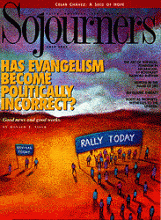Rep. Tony Hall had just been informed that the House of Representatives' Select Committee on Hunger, which he chaired, was being terminated for budgetary reasons. Hunger had captured the heart, time, and energy of the young legislator from Ohio.
But it had become more than an "issue." Hall had seen the human face of hunger in famine-plagued countries around the world, as well as in the poverty-stricken inner cities and forgotten rural areas of his own nation. Those faces stayed with him. They motivated him to try to move the U.S. government to action.
The Select Committee on Hunger spent just $652,000 per year, and James Grant of UNICEF credited the committee with saving millions of lives. By contrast, the powerful House Appropriations Committee spends $19 million a year--just for overhead. Nonetheless, the hunger committee didn't have clout and was cut without debate, process, or even bothering to tell its chair until after the decision was made.
"Why don't you fast? Why don't you go on a hunger fast?" When Janet Hall raised the question of fasting to her husband, Tony Hall was "amazed." He told her he had thought about fasting a couple of weeks before, but had worried about the pressure it might put on their family. "Some things are worth standing up for," she replied. Together, they read Isaiah 58, "Is this not the fast I choose....to share your bread with the hungry...."
After much prayer and seeking counsel from friends, a respected eight-term member of Congress began an open-ended water fast to bring attention to the urgent question of hunger. By his own admission, this was not typical.
Read the Full Article

